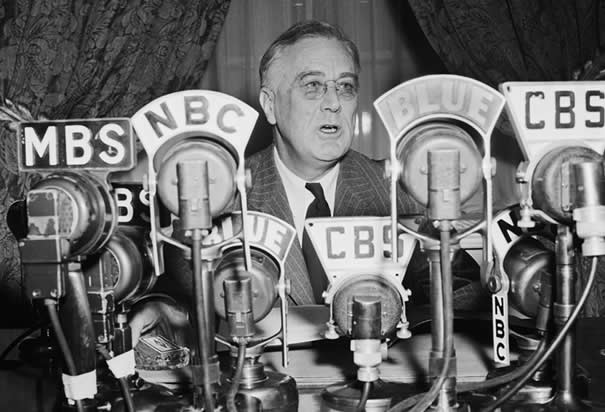
Hallie Flanagan directed the WPA’s Federal Theatre Project (FTP) from 1935 to 1939. In this role, she oversaw the hiring of thousands of unemployed theatre workers and the production of nearly 64,000 theatrical performances for over 30 million audience members [1]. Shortly after the FTP was terminated, Flanagan said: “We know now what many doubted four years ago – that great numbers of people, millions of them, who had never gone to the theatre, or had stopped going, want to go to the theatre if the plays are good and the admission reasonable” [2].
Flanagan was born Hallie Ferguson on August 27, 1890, in Redfield, South Dakota. Her interest in theatre began early: “As a young child, she and her siblings would stage dramatic productions in the family living room. Little did anyone suspect that the tiny Irish girl from the Midwest would grow up to become one of the leading forces in early 20th century theater” [3].
Flanagan received a bachelor’s degree from Grinnell College in 1911 (her future WPA boss, Harry Hopkins, graduated from Grinnell in 1912), and a master’s degree from Radcliffe College in 1924. In between these years, however, she suffered great personal loss: her husband, Murray Flanagan, died of tuberculosis in 1919 and her first son, Jack, died of spinal meningitis in 1922 [4]. After graduate school, Flanagan taught theatre at Grinnell and then at Vassar College in New York. In 1926, she became the first woman to receive a Guggenheim Fellowship. The award allowed her to study the theatre in Europe and the Soviet Union for fourteen months. After her fellowship, Flanagan returned to Vassar to teach and direct plays [5].
When the FTP started up in 1935, Flanagan, her administrators, and WPA workers treated Americans of all income levels to a wide variety of entertainment, which included classic drama, new plays, touring productions, comedies, musicals, dance theatre, African American productions, children’s plays, vaudeville acts, circus performances, and the “Living Newspaper” – an ambitious project that dramatized current events and issues on stage [6]. Many of these productions received critical praise, enjoyed lengthy runs, and drew large audiences.
Despite the FTP’s many accomplishments, it was terminated by Congress in 1939. Many congressmen thought it was a waste of money and were unhappy that FTP plays were racially integrated and explored social and economic issues [7]. Flanagan later charged that certain members of Congress “were afraid of the Federal Theatre because it was educating the people of its vast new audience to know more about government and politics… because it gave Negro actors as well as white actors a chance… because it epitomized too vividly the New Deal theory that every man who can work and can’t find a private job should earn his way by doing useful work at his own profession or trade, for the government” [8].
After the FTP, Flanagan taught for many years at Smith College in Massachusetts. She died on July 23, 1969, after a long struggle with Parkinson’s disease, survived by two grandchildren, a brother, and three step-children from her second marriage to Philip Davis [9]. Flanagan once wrote: “If [the FTP] had been less alive it might have lived longer. But I do not believe anyone who worked on it regrets that it stood from first to last against reaction, against prejudice, against racial, religious, and political intolerance” [10].
Sources
(1) Hallie Flanagan, Arena, New York: Duell, Sloan and Pearce, 1940, pp. 434-436 (using figures from the WPA’s Division of Statistics). (2) “Theatre Aid Urged By Mrs. Flanagan,” New York Times, November 26, 1939. (3) “Hallie Flanagan Davis,” Vassar Encyclopedia, Vassar College, https://vcencyclopedia.vassar.edu/faculty/prominent-faculty/hallie-flanagan-davis.html, accessed February 6, 2016. (4)Ibid. (5)Ibid., and “Hallie Flanagan Davis Is Dead; Headed Federal Theater in 30’s,” New York Times, July 24, 1969. (6) See, generally, note 1. (7) See our summary of the Federal Theatre Project at https://livingnewdeal.org/what-was-the-new-deal/programs/. (8) Hallie Flanagan, “Congress Takes The Stage,” New York Times, August 20, 1939. (9) See note 5, New York Times. (10) See note 1, p. 367.
